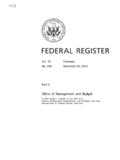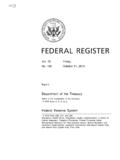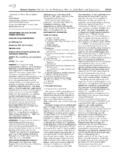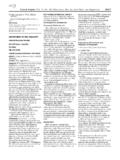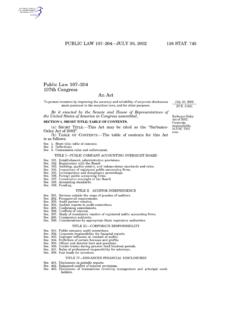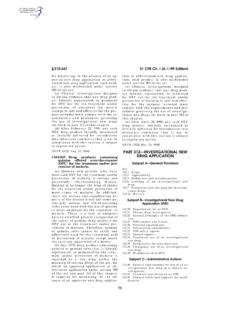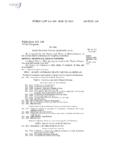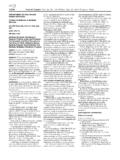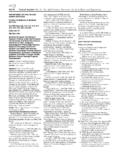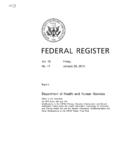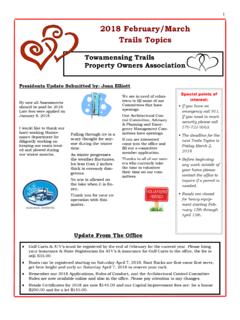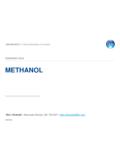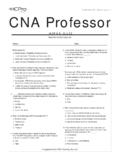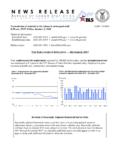Transcription of Federal Register /Vol. 77, No. 22/Thursday, …
1 5213 Federal Register / Vol. 77, No. 22 / thursday , february 2, 2012 / Proposed Rules V. Statutory and Executive Order Reviews This action proposes to make a determination of attainment based on air quality, and would not impose additional requirements beyond those imposed by state law. For that reason, this proposed action: Is not a significant regulatory action subject to review by the Office of Management and Budget under Executive Order 12866 (58 FR 51735, October 4, 1993); Does not impose an information collection burden under the provisions of the Paperwork Reduction Act (44 3501 et seq.); Is certified as not having a significant economic impact on a substantial number of small entities under the Regulatory Flexibility Act (5 601 et seq.); Does not contain any unfunded mandate or significantly or uniquely affect small governments, as described in the Unfunded Mandates Reform Act of 1995 (Pub. L. 104 4); Does not have Federalism implications as specified in Executive Order 13132 (64 FR 43255, August 10, 1999); Is not an economically significant regulatory action based on health or safety risks subject to Executive Order 13045 (62 FR 19885, April 23, 1997); Is not a significant regulatory action subject to Executive Order 13211 (66 FR 28355, May 22, 2001); Is not subject to requirements of Section 12(d) of the National Technology Transfer and Advancement Act of 1995 (15 272 note) because application of those requirements would be inconsistent with the CAA; and Does not provide EPA with the discretionary authority to address, as appropriate, disproportionate human health or environmental effects, using practicable and legally permissible methods, under Executive Order 12898 (59 FR 7629, february 16, 1994).
2 In addition, this proposed determination that the St. Louis area attained the 1997 8-hour ozone NAAQS by its applicable attainment date does not have tribal implications as specified by Executive Order 13175 (65 FR 67249, November 9, 2000), because the SIPs are not approved to apply in Indian country located in the states, and EPA notes that it will not impose substantial direct costs on tribal governments or preempt tribal law. List of Subjects in 40 CFR Part 52 Environmental protection, Air pollution control, ozone, Reporting and recordkeeping requirements. Authority: 42 7401 et seq. Dated: January 19, 2012. Karl Brooks, Regional Administrator, Region 7. Dated: January 25, 2012. Susan Hedman, Regional Administrator, Region 5. [FR Doc. 2012 2336 Filed 2 1 12; 8:45 am] BILLING CODE 6560 50 P DEPARTMENT OF HEALTH AND HUMAN SERVICES Centers for Medicare & Medicaid Services 42 CFR Part 489 [CMS 1350 NC] RIN 0938 AQ51 Medicare Program; Emergency Medical Treatment and Labor Act (EMTALA): Applicability to Hospital Inpatients and Hospitals With Specialized Capabilities AGENCY: Centers for Medicare & Medicaid Services (CMS), HHS.
3 ACTION: Request for comments. SUMMARY: This request for comments addresses the applicability of the Emergency Medical Treatment and Labor Act (EMTALA) to hospital inpatients. DATES: Comment Date: To be assured consideration, comments on the Applicability of EMTALA to Hospitals with Specialized Capabilities (section of this document) must be received at one of the addresses provided below, no later than 5 EST on April 2, 2012. ADDRESSES: In commenting, please refer to file code CMS 1350 NC. Because of staff and resource limitations, we cannot accept comments by facsimile (FAX) transmission. You may submit comments in one of four ways (please choose only one of the ways listed): 1. Electronically. You may submit electronic comments on this regulation to Follow the Submit a comment instructions. 2. By regular mail. You may mail written comments to the following address ONLY: Centers for Medicare & Medicaid Services, Department of Health and Human Services, Attention: CMS 1350 NC, Box 8013, Baltimore, MD 21244 8013.
4 Please allow sufficient time for mailed comments to be received before the close of the comment period. 3. By express or overnight mail. You may send written comments to the following address ONLY: Centers for Medicare & Medicaid Services, Department of Health and Human Services, Attention: CMS 1350 NC, Mail Stop C4 26 05, 7500 Security Boulevard, Baltimore, MD 21244 1850. 4. By hand or courier. If you prefer, you may deliver (by hand or courier) your written comments before the close of the comment period to either of the following addresses: a. For delivery in Washington, DC Centers for Medicare & Medicaid Services, Department of Health and Human Services, Room 445 G, Hubert H. Humphrey Building, 200 Independence Avenue SW., Washington, DC 20201 (Because access to the interior of the Hubert H. Humphrey Building is not readily available to persons without Federal government identification, commenters are encouraged to leave their comments in the CMS drop slots located in the main lobby of the building.)
5 A stamp-in clock is available for persons wishing to retain a proof of filing by stamping in and retaining an extra copy of the comments being filed.) b. For delivery in Baltimore, MD Centers for Medicare & Medicaid Services, Department of Health and Human Services, 7500 Security Boulevard, Baltimore, MD 21244 1850. If you intend to deliver your comments to the Baltimore address, please call telephone number (410) 786 1066 in advance to schedule your arrival with one of our staff members. Comments mailed to the addresses indicated as appropriate for hand or courier delivery may be delayed and received after the comment period. For information on viewing public comments, see the beginning of the SUPPLEMENTARY INFORMATION section. FOR FURTHER INFORMATION CONTACT: Renate Dombrowski, (410) 786 4645, Ankit Patel, (410) 786 4537. SUPPLEMENTARY INFORMATION: Inspection of Public Comments: All comments received before the close of the comment period are available for viewing by the public, including any personally identifiable or confidential business information that is included in a comment.
6 We post all comments received before the close of the comment period on the following Web site as soon as possible after they have been received: http:// Follow the search instructions on that Web site to view public comments. Comments received timely will also be available for public inspection as they are received, generally beginning approximately 3 weeks after publication VerDate Mar<15>2010 16:24 Feb 01, 2012 Jkt 226001 PO 00000 Frm 00019 Fmt 4702 Sfmt 4702 E:\FR\FM\ 02 FEP1tkelley on DSK3 SPTVN1 PROD with PROPOSALS5214 Federal Register / Vol. 77, No. 22 / thursday , february 2, 2012 / Proposed Rules of a document, at the headquarters of the Centers for Medicare & Medicaid Services, 7500 Security Boulevard, Baltimore, Maryland 21244, Monday through Friday of each week from 8:30 to 4 To schedule an appointment to view public comments, phone 1 800 743 3951. I. Background Sections 1866(a)(1)(I), 1866(a)(1)(N), and 1867 of the Social Security Act (the Act) were enacted as parts of the Emergency Medical Treatment and Labor Act (EMTALA).
7 These statutory provisions impose specific obligations on certain Medicare-participating hospitals and critical access hospitals (CAHs). (Throughout this document, when we reference the obligation of a hospital under these sections of the Act and in our regulations, we mean to include CAHs as well.) These obligations concern individuals who come to a hospital s dedicated emergency department (as defined at 42 CFR (b)) and request examination or treatment for a medical condition and apply to all of these individuals regardless of whether they are beneficiaries of any program under the Act. EMTALA, also known as the patient antidumping statute, was passed in 1986 as part of the Consolidated Omnibus Budget Reconciliation Act of 1985 (COBRA), Public Law 99 272. Congress incorporated these antidumping provisions within the Social Security Act to ensure that any individual with an emergency medical condition (EMC), regardless of the individual s insurance coverage, is not denied essential lifesaving services.
8 Under section 1866(a)(1)(I)(i) of the Act, a hospital that fails to fulfill its EMTALA obligations under these provisions may be subject to termination of its Medicare provider agreement which would result in the loss of Medicare and Medicaid payments. In addition, section 1867(d) of the Act provides for the imposition of civil monetary penalties on a hospital or physician who negligently violates a requirement of EMTALA under section 1867 of the Act. Section 1867 of the Act sets forth requirements for medical screening examinations for individuals who come to the emergency department of a hospital and request examination or treatment for a medical condition. The statute further provides that, if a hospital finds that such an individual has an EMC, it is obligated to provide that individual with either necessary stabilizing treatment or an appropriate transfer to another medical facility where stabilization can occur. The EMTALA statute also separately outlines the obligation of hospitals to receive appropriate transfers from other hospitals.
9 Section 1867(g) of the Act states that A participating hospital that has specialized capabilities or facilities (such as burn units, shock-trauma units, neonatal intensive care units, or (with respect to rural areas) regional referral centers as identified by the Secretary in regulation) shall not refuse to accept an appropriate transfer of an individual who requires such specialized capabilities or facilities if the hospital has the capacity to treat the individual. The regulations implementing section 1867 of the Act are found at 42 CFR The regulations at 42 CFR (l), (m), (q), and (r) also refer to certain EMTALA requirements outlined in section 1866 of the Act. The Interpretive Guidelines concerning EMTALA are found at Appendix V of the CMS State Operations Manual: A. Applicability of EMTALA to Hospital Inpatients The focus of EMTALA routinely involves the treatment of individuals who come to the emergency department, as we have defined that term at 42 CFR (b); that is, the individual is in a hospital-owned and operated ambulance or has presented at a hospital s dedicated emergency department * * * and requests examination or treatment for a medical condition, or has such a request made on his or her behalf [or] [h]as presented on hospital property * * * other than the dedicated emergency department, and requests examination or treatment for what may be an emergency medical condition, or has such a request made on his or her behalf.
10 However, concerns have also arisen about the continuing applicability of EMTALA to hospital inpatients. We have previously discussed the applicability of EMTALA to hospital inpatients in the May 9, 2002 (67 FR 31475) Hospital Inpatient Prospective Payment System (IPPS) proposed rule entitled Medicare Program; Changes to the Hospital Inpatient Prospective Payment Systems and Fiscal Year 2003 Rates (hereinafter referred to as the FY 2003 IPPS proposed rule) and the September 9, 2003 (68 FR 53243) stand- alone final rule on EMTALA entitled Medicare Program; Clarifying Policies Related to the Responsibilities of Medicare-Participating Hospitals in Treating Individuals With Emergency Medical Conditions (hereinafter referred to as the 2003 EMTALA final rule). As we noted in these prior proposed and final rules, in 1999, the United States Supreme Court considered a case (Roberts v. Galen of Virginia, 525 249 (1999)) that involved, in part, the question of whether EMTALA applies to hospital inpatients.
